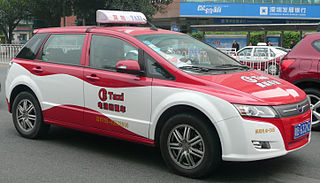Related Research Articles

The economy of South Korea is a highly developed mixed economy dominated by family-owned conglomerates called chaebols. It is the 4th largest GDP in Asia and the 10th largest in the world. South Korea is known for its rise from one of the poorest countries in the world to a developed, high-income country in just a few generations. This economic growth has been described as the Miracle on the Han River, which has brought South Korea to the ranks of countries in the OECD and the G-20. South Korea still remains one of the fastest growing developed countries in the world following the Great Recession. It is included in the group of Next Eleven countries as having the potential to play a dominant role in the global economy by the middle of the 21st century.

Manufacturing is the production of goods through the use of labor, machines, tools, and chemical or biological processing or formulation. It is the essence of secondary sector of the economy. The term may refer to a range of human activity, from handicraft to high-tech, but it is most commonly applied to industrial design, in which raw materials from the primary sector are transformed into finished goods on a large scale. Such goods may be sold to other manufacturers for the production of other more complex products, or distributed via the tertiary industry to end users and consumers.

A self-driving car, also known as an autonomous vehicle, driverless car, or robo-car is a vehicle that is capable of sensing its environment and moving safely with little or no human input.
Automotive engineering, along with aerospace engineering and naval architecture, is a branch of vehicle engineering, incorporating elements of mechanical, electrical, electronic, software, and safety engineering as applied to the design, manufacture and operation of motorcycles, automobiles, and trucks and their respective engineering subsystems. It also includes modification of vehicles. Manufacturing domain deals with the creation and assembling the whole parts of automobiles is also included in it. The automotive engineering field is research -intensive and involves direct application of mathematical models and formulas. The study of automotive engineering is to design, develop, fabricate, and test vehicles or vehicle components from the concept stage to production stage. Production, development, and manufacturing are the three major functions in this field.

Magna International Inc. is a Canadian mobility technology company for automakers. Magna is currently investing heavily in AI, and Level 5 Automation. It is one of the largest companies in Canada and was recognized on the 2019 Forbes Global 2000. The company is the largest automobile parts manufacturer in North America by sales of original equipment parts, it has ranked consistently in the Fortune Global 500 list for 20 years in a row since 2001. It produces automotive systems, assemblies, modules, and components, which are supplied to General Motors, Ford Motor Company and FCA, as well as BMW, Mercedes, Volkswagen and Tesla Motors, among others.

Telematics is an interdisciplinary field that encompasses telecommunications, vehicular technologies, electrical engineering, and computer science. Telematics can involve any of the following:

Automotive design is the process of developing the appearance, and to some extent the ergonomics, of motor vehicles, including automobiles, motorcycles, trucks, buses, coaches, and vans.
The following outline is provided as an overview of and topical guide to management:

Manufacturing engineering is a branch of professional engineering that shares many common concepts and ideas with other fields of engineering such as mechanical, chemical, electrical, and industrial engineering. Manufacturing engineering requires the ability to plan the practices of manufacturing; to research and to develop tools, processes, machines and equipment; and to integrate the facilities and systems for producing quality products with the optimum expenditure of capital.

Advanced Technology Vehicles Manufacturing (ATVM) Loan Program is a $25 billion direct loan program funded by Congress in fall 2008 to provide debt capital to the U.S. automotive industry for the purpose of funding projects that help vehicles manufactured in the U.S. meet higher mileage requirements and lessen U.S. dependence on foreign oil. Of the 108 requests made, 5 were approved to receive $8.4 billion, with the majority of that amount under repayment.
The American Council for an Energy-Efficient Economy, or ACEEE, is a nonprofit, 501(c)(3) organization. Founded in 1980, ACEEE's mission is to act as a catalyst to advance energy efficiency policies, programs, technologies, investments, and behaviors in order to help achieve greater economic prosperity, energy security, and environmental protection.

Industrial engineering is an engineering profession that is concerned with the optimization of complex processes, systems, or organizations by developing, improving and implementing integrated systems of people, money, knowledge, information and equipment.

Automotive Research Association of India (ARAI) is co-operative industrial research association by the automotive industry with the Ministry of Industries, Government Of India The objectives of the Association are Research and Development in automotive engineering for industry, product design and development, evaluation of automotive equipment and ancillaries, standardisation, technical information services, execution of advanced courses on the application of modern technology and conduct of specific tests.

China is both the largest manufacturer and buyer of electric vehicles in the world, accounting for more than half of all electric cars made and sold in the world in 2018. China also makes 99% of the world's electric buses.

A circular economy is an economic system aimed at eliminating waste and the continual use of resources. Circular systems employ reuse, sharing, repair, refurbishment, remanufacturing and recycling to create a closed-loop system, minimising the use of resource inputs and the creation of waste, pollution and carbon emissions. The circular economy aims to keep products, equipment and infrastructure in use for longer, thus improving the productivity of these resources. Waste materials and energy should become input for other processes: either a component or recovered resource for another industrial process or as regenerative resources for nature. This regenerative approach is in contrast to the traditional linear economy, which has a "take, make, dispose" model of production.
A metropolitan economy refers to the cohesive, naturally evolving concentration of industries, commerce, markets, firms, housing, human capital, infrastructure and other economic elements that are comprised in a particular metropolitan area. Rather than the definition of distinct urban and suburban economies that evolve and function independently, a metropolitan economy encompasses all interdependent jurisdictions of particular regional clusters. This type of economy has all its units functioning together in a trans-boundary landscape that often crosses city, county, state, province, and even national lines. Metropolitan economies expand from the parochial view taken in urban economics which focuses entirely on a city's spatial structure, and broadens it into a metropolitan's spatial and social/economic structure.
The following outline is provided as an overview of and topical guide to production:

The Motor & Equipment Manufacturers Association (MEMA) was founded in 1904. MEMA represents more than 1,000 companies that manufacture motor vehicle components and systems for the original equipment and aftermarket segments of the light vehicle and heavy-duty motor vehicle manufacturing industry in the United States. MEMA works at state, federal, and international levels to ensure that the marketplace and public policies support the development of advanced, transformative technologies that enable safer, smarter, and more efficient vehicles. Motor vehicle parts manufacturers are the nation’s largest manufacturing sector, directly employing more than 871,000 U.S. workers. Motor vehicle component manufacturers are the largest employer of manufacturing jobs in the U.S., contributing nearly 3 percent of the U.S. gross domestic product. Motor vehicle parts suppliers generate a total direct and indirect employment impact of 4.26 million jobs, up nearly 18 percent since 2012.
Industrial and production engineering (IPE) is an interdisciplinary engineering discipline that includes manufacturing technology, engineering sciences, management science, and optimization of complex processes, systems, or organizations. It is concerned with the understanding and application of engineering procedures in manufacturing processes and production methods. Industrial engineering dates back all the way to the industrial revolution, initiated in 1700s by Sir Adam Smith, Henry Ford, Eli Whitney, Frank Gilbreth and Lilian Gilbreth, Henry Gantt, F.W. Taylor, etc. After the 1970s, industrial and production engineering developed worldwide and started to widely use automation and robotics. Industrial and production engineering includes three areas: Mechanical engineering, industrial engineering, and management science.
Sandy Munro is an automotive engineer who specialises in machine tools and manufacturing.
References
- ↑ Transportation, University of Michigan Office for the Study of Automotive. "Office for the Study of Automotive Transportation (University of Michigan) records". Quod.lib.umich.edu. Retrieved 26 March 2019.
- ↑ "Why Stellantis makes some American autoworkers nervous". Detroit News.
- ↑ "Automakers forced to cut production amid global shortage of computer chips". NBC News.
- ↑ Oosting, Jonathan (2017-08-08). "Tesla fighting Michigan sales law as Model 3 rolls out". Detroitnews.com . Retrieved 2017-08-09.